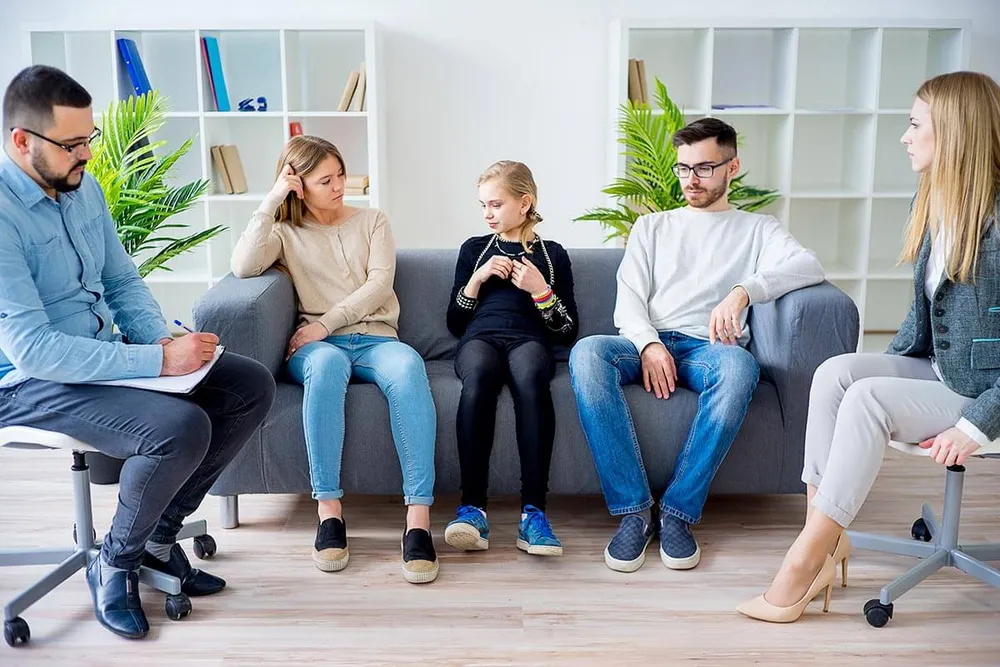Family Therapy in Addiction Recovery: Building Stronger Connections and Healing as One
Introduction
Quite often, families are crucial to the recovery journey of their loved ones. As individuals struggling with substance abuse often fail to acknowledge their issues, family members frequently take the initiative. This is typically termed an “intervention,” a collaborative meeting involving the family, the person challenged by addiction, and a professional.
However, following the intervention and inpatient care, there can be many aspects to rebuild. Marriage and family therapy can be essential parts of the recovery journey for both the individual facing addiction and their family.
What Is Family Therapy?
Marriage and family therapies are key elements that aid the rehabilitation process. They offer support to everyone involved and can be beneficial at any point during recovery.
Rather than viewing the person battling addiction as a separate entity, couples and family therapy treats the family as a whole, focusing on every member involved. These therapies aim to strengthen family bonds by facilitating understanding and forgiveness among members.
- A family therapist primarily acts as an observer. In the initial sessions, they assess how addiction has impacted the mental and emotional well-being of each family member.
- They consider each individual’s personality (parents and siblings) to devise a therapy plan aimed at enhancing family communication and relationships. The family then practices these principles during sessions and explores healthier ways of interaction.
- Eventually, session frequency decreases, and the therapist evaluates the family’s progress and remaining issues. By the end of the sessions, family members should feel more secure in their coping strategies and have a better grasp of themselves and their family dynamics.
What Occurs During A Family Therapy Session?
Many recovery programs incorporate some form of family or marriage therapy. During these sessions, family members have the chance to express how substance abuse and addiction have altered their relationships.
The facilitator or therapist leading these sessions should have credentials such as an MFT or similar, like a mental health expert with specialized training in family systems and development. These skills enable the therapist to tackle emotional and behavioral issues within the family dynamic and suggest solutions and strategies for each member to apply.
Throughout therapy sessions, various topics might emerge, such as:
- Issues or reactions linked to substance abuse
- Changes in relationships due to the addiction cycle
- Realistic goals the family envisions moving forward
- Plans made by the loved one while others are in treatment
- Family discussions on finances, employment, children, and individual duties
- Family traumas stemming from addiction, like abuse and manipulation
- Rebuilding trust and fostering healthy communication
- Addressing co-dependencies and enabling patterns
- Or any other relevant topics that may surface
Given the complexities of addiction, having the support and encouragement of loved ones is vital. This approach not only enhances treatment outcomes but also promotes a holistic and long-term balance and well-being for the family.
How Long Does Family Therapy Last?
The length and frequency of family therapy sessions vary based on individual circumstances. Family therapy doesn't follow a “one-size-fits-all” approach. Instead, it focuses on identifying and resolving issues, providing strategies for sustained family well-being.
For many, family therapy directly addresses behavioral concerns, correcting addiction triggers and enabling habits. However, these aren't immediate fixes. Some may experience a shorter healing period, while others require prolonged dedication to overcome ingrained habits. Ultimately, there’s no universal formula for the effectiveness of family and marriage therapies—it depends on the individual, their family, and their unique situations.
Does Family Therapy Really Work?
Family and marriage therapy alone may not be sufficient to conquer addiction, but it remains a key element of the recovery process—not only for the individual but also for the entire family. This approach is one of the most promising, leading to significant progress in long-term recovery.
Despite the challenges in treating substance abuse and addiction, alternative therapies like outdoor treatment programs or psychological counseling can increase the chances of success. Other methods, such as multidimensional family therapy, have shown remarkable results among teens facing substance abuse issues. Considering the family and its interpersonal dynamics provides a comprehensive view of the individual’s struggles. Additionally, involving the family as a supportive network can enhance recovery stability and reduce relapse risks over time.
Varieties of Therapies, Varieties of Results
For long-term recovery success, individuals must carefully choose the integrative and complementary therapies that best suit them—financially, mentally, emotionally, and addressing their unique challenges. Specific considerations should be made when selecting a therapist or program, such as accreditation, clinical experience, and program features.
Besides family therapy, many in recovery opt for spiritual counseling to identify and practice a philosophy aligning with their lifestyle and beliefs. This can also help the family unite under a shared goal and language that meets their collective needs. Ultimately, the aim is a cohesive front of healthy communication and support—a recovery process that includes everyone.
Conclusion
Supporting a loved one during their treatment is vital to their recovery. Moreover, addressing and learning to overcome addiction’s consequences can be empowering and healing for all involved.
For more information about beginning your healing journey at Impact Recovery, connect with a member of our team here.
